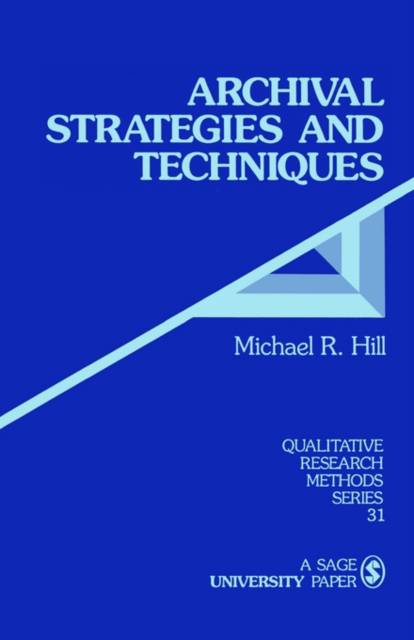
- Retrait gratuit dans votre magasin Club
- 7.000.000 titres dans notre catalogue
- Payer en toute sécurité
- Toujours un magasin près de chez vous
- Retrait gratuit dans votre magasin Club
- 7.000.0000 titres dans notre catalogue
- Payer en toute sécurité
- Toujours un magasin près de chez vous
Description
I think that anyone who has an interest in traditional archival research will find this a thoughtful and valuable guide to the many different elements of the research process. --Theory and Methods "His research advice is systematic and thorough and could easily serve for other researchers than sociobiographers. In eighty-eight pages, Hill has managed to pack not only this sound research advice but a critique of archival practices and a six-page bibliography. The book is certainly worth a read. . . . and could give archivists an opportunity to broaden their sociological horizons." --Archivaria "Michael Hill′s monograph, Archival Strategies and Techniques, depicts a world that some might think would be as dusty as old manuscripts themselves, but in the process of describing the excitements, joys, frustrations, and ethical conundrums, he has demonstrated that the archival scholar can share thrills and fears with Indiana Jones. Hill′s book is filled with lively anecdote, compelling analysis and a full measure of wit. This monograph will be an invaluable companion for anyone planning to spend time in libraries, dusty or otherwise." --Gary Alan Fine, University of Georgia "Much more than a how-to book, Michael Hill interprets archives and their use from a Goffmanian sociological perspective. As an extra benefit, he guides readers through the archival process by drawing on a sociological/historical project--the recovery of unknown or presently discounted social scientists. Any teacher who assigns a term paper to students will want to recommend this book!" --Shulamit Reinharz, Brandeis University "Michael Hill has produced a lively and, for some of us, comforting guide to archival research in sociology. . . . The book is comforting because among the gems contained within this short monograph is a discussion of the need to recover `unknown or presently discounted social scientists′ as an important epistemological task." --Network Historical and biographical research is increasingly used by social scientists as an important form of qualitative research. This kind of research usually requires the extensive use of formal archives housed in university and government buildings, museums, and other institutions. This concise, but practical book provides the "rules of the game" for the novice on conducting and preparing to work in archives, the protocol of using archives, and ways of organizing and referencing the useful data from the archive. This intriguing volume will interest scholars and students from a wide array of disciplines using this type of research for social analysis.
Spécifications
Parties prenantes
- Auteur(s) :
- Editeur:
Contenu
- Nombre de pages :
- 96
- Langue:
- Anglais
- Collection :
- Tome:
- n° 31
Caractéristiques
- EAN:
- 9780803948259
- Date de parution :
- 28-09-93
- Format:
- Livre broché
- Format numérique:
- Trade paperback (VS)
- Dimensions :
- 156 mm x 233 mm
- Poids :
- 149 g

Les avis
Nous publions uniquement les avis qui respectent les conditions requises. Consultez nos conditions pour les avis.






